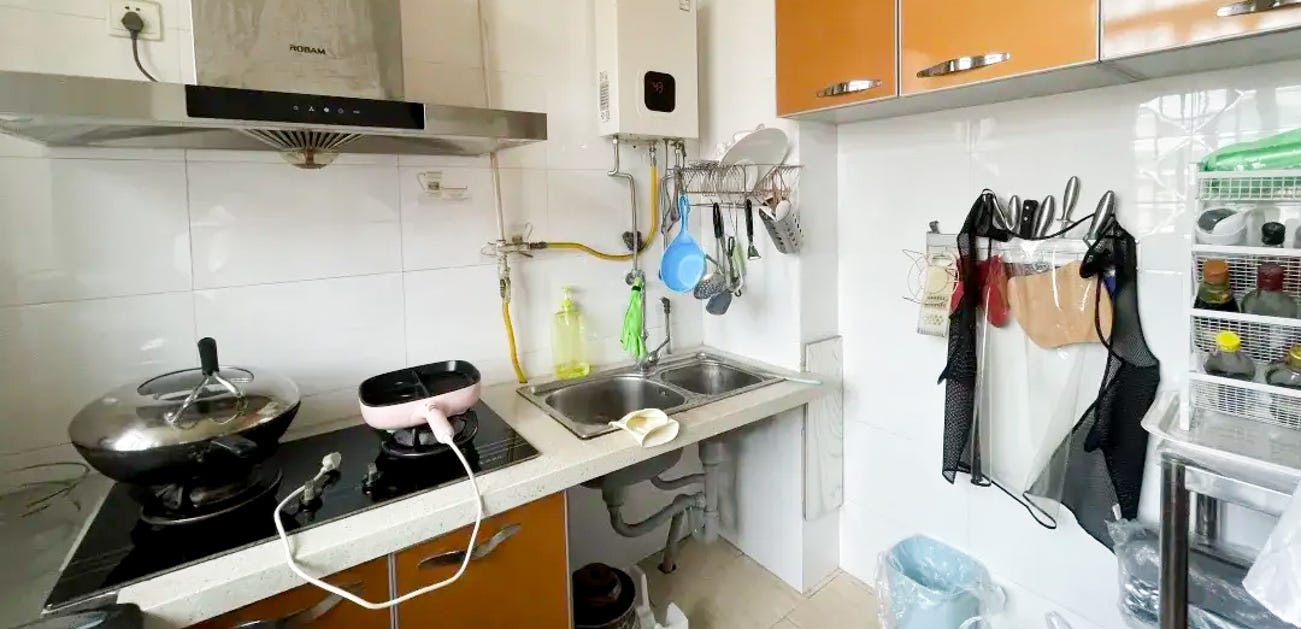Warm welcome all…
Advanced economies are no longer the welcoming buyers they were. While Beijing waits for the Global South to step up, local households, which have mostly maxed out on appliances in recent years, were told in April to replace their ‘not green enough’ fridges and range hoods.
NEVs are so much the hot-button item that even with budgets otherwise very tight, Beijing announced subsidies of up to about C¥10,000 per car in late April.
But at the macro level, Beijing is sticking to its course—structural change, not stimulus, is needed.
The PRC’s disappearing obstetrics departments are the latest reminder of the health sector's vulnerability.
Happy reading
Philippa
With the post-COVID recovery still rocky, Beijing nonetheless seeks to bypass conventional stimulus, instead solving problems through structural adjustment. It believes it should address fundamentals while leaning into the PRC's long-term prospects. This strategy is seen in Opinions issued 12 April 2024. This guiding document offers a blueprint for the next decade of capital market development.
Markets declined sharply from August 2023. Instructing state assets (the ‘national team’) to purchase equities no doubt ‘rescued’ prices, but to effectively arrest years of unending decline, Beijing has now moved to improve market fundamentals. Listed firms are on notice to rectify widespread malpractice, share more dividends and abstain from fraud. Recalcitrants face delisting and other penalties.
This aims to reassure institutional investors, hopefully stabilising markets and allowing them to fulfil their original purpose: funding future industry champions. Will the markets buy this vision? Investors, eyes ever on short-term gain, may need more immediate incentives to reenter markets.
Given shrinking foreign trade and overcapacity allegations by advanced economies, pressure to mandate consumption is high. Following a State Council cue in March, MofCOM called for consumer goods renewals, setting targets for upgrades, phase-outs, recycling for autos, home renovations, and electrical appliances. Funding details remained sketchy, but towards the end of fthe month substantial subsidies were finally announced for autos, up to C¥10,000.
Trade underperformed in March amid weak demand, with exports and imports down 7.5 and 1.9 percent over 2023. Export volumes remain high, suggesting exporters are still slashing prices.
Trade risks prompted a newly passed Tariff Law, giving the State Council greater authority to respond to protectionist tariffs.
FTA (Free Trade Agreement) moves continue with South America. Negotiations with El Salvador are to begin. The FTA with Ecuador enters into effect in May 2024.
Addressing Western derisking, veteran trade commentator Jiang Xiaojuan 江小涓 urges deeper integration with global value chains: this would reap the benefits of economies of scale and tech advancement while leveraging global resources and markets. Echoing her, MofCOM rolled out new measures to bolster foreign investment in PRC tech firms, pledging equal treatment for international firms and supporting more overseas listings.
Diplomacy was in full swing in April. On the US relations front, Presidents Xi and Biden held a first phone call since a November 2023 summit in San Francisco. Held in early April in Beijing, PRC commentators deemed it a positive sign. Visits by Janet Yellen, Treasury Secretary, and Antony Blinken, Secretary of State, followed in swift succession. Their tight high-level schedules hint that the two states are willing to table their differences. Yet palpable improvement remains to be seen.
On the EU front, a key event was German Chancellor Olaf Scholz's three-day PRC tour. Flanked by three federal ministers and a large business delegation, he lobbied for German interests; staying in line with EU policy (reducing strategic dependence on the PRC) was a pretty tall order.
This month, Beijing’s interest in the Global South spanned South America, South-East Asia and Oceania. Xi held separate talks with Suriname president Chandrikapersad Santokhi, Indonesian president-elect Prabowo Subianto, and Micronesia president Wesley W. Simina in Beijing.
In energy, the rapid growth of renewable capacity over the past decade made the PRC a global leader in energy transition. Yet that growth is placing greater pressure on local power grids. New national data shows that renewable power curtailment exceeded the 5 percent threshold in many provinces in February, a first since 2019. Improving the market mechanism and more rational power utilisation targets are required to increase consumption, experts argue.
Long called for, a shift from dual control of energy consumption and intensity to carbon emissions was approved by State Council. The move will, in theory, incentivise renewable consumption by removing hard caps on energy use. Economic development would then be tied to greater green power use by industry. Yet, given that industrial energy requirements remain rigid and intensive, fossil fuel use may increase in the short term.
April's scitech agenda focused on industry. MIIT launched a new structure, including sub-divisions for future industries and tech markets. At the annual Zhongguancun Forum, a plan was unveiled to transform the Beijing district, the PRC's first high-tech zone set up in the 1980s, into a 'world-leading scitech park' by 2027. Proximity to leading universities and labs is hoped to bridge gaps between research and industry.
SASAC selected the first batch of 'pioneering' SOEs designed to mimic startups. However, experts question whether these wannabe tech unicorns can break free from traditional SOE incentive handicaps.
The first-ever National Data Work Conference, held in Beijing 2 April, identified market-oriented data allocation as the primary goal for the year ahead. This roadmap includes formalising protocols for data property rights, valuation and transaction, and support for computing infrastructure.
A new action plan sets a 2030 deadline for a much-touted 50 million tonnes grain production boost. Despite nine harvests in a row running over the 650 million tonne baseline, yields lag behind major global players. Hot on the heels of the plans came MARA’s major crop cultivation ‘best practices’ educational series. MARA and MOF announced 50 new ag industrial parks for 2024 and extended use rights to CAAS-developed soybean yield-boosting gene traits to private operators and research centres.
‘China agriculture outlook report (2024-33)’ presents measures to boost grain output to over 766 million tonnes in 2033 (10.2 percent over 2023). GM breakthroughs are needed for the projected 12 percent for corn and an eye-watering 81 percent for soybean output, with corn imports falling 70 and soybeans 21 percent. Cooling this confidence, 2024 corn imports have been revised up to 20 million. Given the current low domestic production, soybean imports still remain 100 million tonnes. Hitting 2033’s soybean forecast would still fail to reduce import reliance below 70 percent.
Headline judicial statistics for 2023 were unveiled on the 24th World Intellectual Property Day, hinting at a resolve to foster international trust in PRC business rules. IPR violations reviewed for prosecution through the year rose some 50 percent y-o-y to 30,700; those infringing copyright or trade secrets were up 1.4 times and 96.6 percent, respectively. Cases involving civil proceedings' supervision rose twofold: the number of protests and supervisory retrial recommendations filed eightfold y-o-y. Prosecutors vow to bolster supervision of cases involving tech secrets, IC layouts, etc., and in a following step to help develop new productive forces.
Stricter copyright protection is indeed on the agenda. Copyright registrations rose some 40 percent y-o-y in 2023. Copyright for AI-generated content is a research topic, and harsh action on film piracy is underway. Regulations and measures for ‘high-quality development’ of copyright are in the works, revealed the National Copyright Administration.
The environment saw more protection in 2023, but the foundation remains weak, Zhao Yingmin 赵英民, MEE vice-minister, told the NPC. While annual indicators for air, soil and water quality were all met, pollution, most notably a rebound in air pollution and increased CO2 emissions, remains an issue, with few easy fixes on the horizon.
Financial rewards for environmental compliance are rising on the agenda. New ‘milestone’ regulations will require localities to set up compensation protocols, and provinces will negotiate funds for interregional protective measures. Beijing will foot the bill for protecting critical zones such as forests and wetlands.
A three-year action plan reforming payment for DRG/DIP (Diagnosis Related Groups/Diagnosis Intervention Packet) will end in 2024. Reporting the results as of 2023, NHSA (National Healthcare Security Administration) denied concerns over lower participation in basic medical insurance, pointing to over 95 percent coverage.
Responding to the public outcry about disappearing obstetrics units, NHC (National Health Commission) placed public hospitals on notice to ensure the survival of midwifery and obstetrics services.
Given employment was stable and growing in Q1, emphasis was placed on making university students and migrant workers more employable. Total recruitment activities and job postings rose ten percent in the MoHRSS (Ministry of Human Resources and Social Security) 2024 ‘ Spring Breeze’ employment drive. Sixty-four thousand recruitment events were held, and over 43 million job vacancies were posted.
Matching skills training for students to future job markets has been a focus. MoE (Ministry of Education) added 24 majors to its 2023 ‘Directory of undergraduate majors’, the highest recorded change since 2012. Engineering, education, and economics were the top three domains that added majors. An action plan was launched to nurture digital skills to support the ICT sector (2024–26), boosting funding and improving training and evaluation for the digitally skilled.
MoE enacted measures to make compulsory education enrolments more transparent and fair. Interagency cooperation was urged to support the enrolment of children with disabilities, left-behind children, and children in difficult circumstances





Any word on when China's Communist Constitutional guarantees will be effective as a defense in Chinese courts?